Guest blogged by Ernest A. Canning
 Last Friday, Aug. 5, in a 15-page letter [PDF], the American Civil Liberties Union (ACLU) asked the U.S. Department of Justice to deny pre-clearance of South Carolina's photo ID law, as signed into law by Gov. Nikki Haley (R), pursuant to Section 5 of the Voting Rights Act. Pre-clearance must be denied if the law was enacted for a discriminatory purpose or if it has "the effect of denying or abridging the right to vote on account of race or color."
Last Friday, Aug. 5, in a 15-page letter [PDF], the American Civil Liberties Union (ACLU) asked the U.S. Department of Justice to deny pre-clearance of South Carolina's photo ID law, as signed into law by Gov. Nikki Haley (R), pursuant to Section 5 of the Voting Rights Act. Pre-clearance must be denied if the law was enacted for a discriminatory purpose or if it has "the effect of denying or abridging the right to vote on account of race or color."
As the Voting Rights Act of 1965 addressed specific barriers to voting that had been enacted by the Jim Crow South, the ACLU letter, of necessity, focuses upon the disproportionate impact upon South Carolina's African-American electorate who are amongst the 178,175 registered South Carolina voters who do not possess the forms of photo identification required by the state's new polling place Photo ID restriction law. However, the ACLU's discussion of pretextual justifications for the Palmetto State's new law exposes a GOP intent to suppress the vote on the basis of class as well as race not only in South Carolina but in the spate of similar photo ID laws that are being pushed in state after state by the GOP, and supported by their paid partisan shills in the right-wing media...
'Voter Fraud' as Pretext for Unlawful Discrimination
In its letter, the ACLU argues that polling place photo ID restrictions have "the potential to prevent one, and only one, type of voter fraud --- voter impersonation...a person...going to a polling place on Election day, fraudulently requesting a ballot under the name of a qualified voter of that precinct who has registered to vote but has not voted prior to the fraud...The ID requirement will not prevent any other type of fraud, such as double-voting, felon voting, non-citizen voting, absentee fraud, registration fraud, vote buying, or negative vote buying."
The ACLU notes that the GOP proponents of the bill failed to "conduct any studies to determine the existence...of voter fraud" and cited "out-of-state statistics regarding the number of people who are registered in more than one state and the number of felons who are registered to vote" --- statistics that "are irrelevant" because these forms of voter fraud "could not be solved by" the photo ID law.
The ACLU, in support of its claim that GOP claims of "voter fraud" are but a pretext for voter suppression, cites an item The BRAD BLOG covered on April 11, 2007 after The New York Times revealed that the Bush-appointed members of the U.S. Elections Commission (EAC) first suppressed and later altered a draft report which concluded that GOP claims of "voter fraud" were overblown.
It also points to "The Truth About Voter Fraud," the 2007 study by the non-partisan Brennan Center for Justice at NYU Law School "which found that 'voter fraud is extraordinarily rare' but did not find a single incidence of voter impersonation" --- for an obvious reason:
The ACLU, thus, underscored the point made by Robert Brandon of The Inquirer that "photo identification at the polls is a solution in search of a problem."
Polling place Photo ID restrictions as new 'poll tax'
In Harper vs. Virginia Board of Elections (1966), the U.S. Supreme Court invalidated a poll tax, stating:
The ACLU letter contains significant statistics that suggest that South Carolina's new photo ID law operates as an illegal poll tax, especially for the disproportionate number of African Americans who live below the federal poverty level.
In a recent article here, Brad Friedman exposed the hoops that a Wisconsin voter had to jump through in order to obtain a newly required photo ID in that state, after they hastily passed a similar law in advance of the upcoming state Senate recall elections.
While the photo ID is to be issued for free in the Palmetto State, the certified documents needed to obtain the photo ID are not. A certified copy of a birth certificate runs from $12 to $17. A passport comes at a cost of $165. The cost of naturalization documents runs from $345-$460.
For most voters, the ACLU asserts, DMVs are not within walking distance (remember, if you don't have a state-issued Photo ID already, it's very likely to be because you don't have a drivers license at all) and South Carolina's public transportation is less than adequate. Moreover, since the law requires that voters appear at a DMV in person and the state does not mandate paid leave for the purpose of obtaining the ID, an employee not only faces lost wages but possible loss of a job if he or she takes the time off to get the photo ID.
Ball in Eric Holder's court
There can be little question but that the case made by the ACLU with respect to South Carolina could easily be applied to Florida, Texas and every other state covered by the Voting Rights Act that has recently passed similar new polling place Photo ID restrictions. The only question is whether the U.S. Justice Department will abide by the responsibilities imposed by the Voting Rights Act, or, as has become all too commonplace under the Obama administration, turn a blind eye to justice in the face of the hard-right noise --- and voter suppression --- machine.
UPDATE 08/09/11: Around 50 people attended a rally against SC’s photo ID law held at the International Longshoremen’s Assoc. Hall in Charlestown, according to The Post and Courier.
Underscoring the significant roadblock imposed by the new law, Andrea Tangredi, a well-educated MA transplant, said she had "spent at least 17 hours online and in person since July trying to get a license here, only to face hurdle after hurdle tied to her several name changes" (occasioned by successive marriages).
UPDATE 08/17/11: The DOJ, which has not yet made a formal pre-clearance determination, ruled that South Carolina’s new photo ID law cannot be enforced for any elections this year.
Ernest A. Canning has been an active member of the California state bar since 1977. Mr. Canning has received both undergraduate and graduate degrees in political science as well as a juris doctor. He is also a Vietnam vet (4th Infantry, Central Highlands 1968).


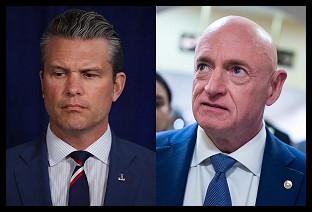 Court Blocks Hegseth Censure of Sen. Mark Kelly
Court Blocks Hegseth Censure of Sen. Mark Kelly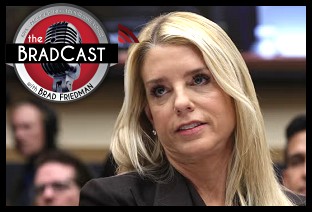 Harpy Tantrums, Legal Losses, Election Fails, Retreating ICE and Other Hopeful Signs: 'BradCast' 2/12/26
Harpy Tantrums, Legal Losses, Election Fails, Retreating ICE and Other Hopeful Signs: 'BradCast' 2/12/26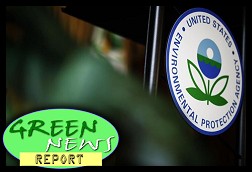 'Green News Report' 2/12/26
'Green News Report' 2/12/26
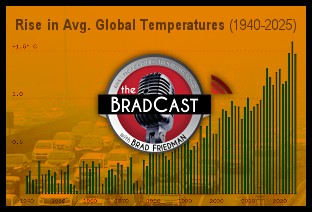 'Let Kids with Asthma Suffer': Trump to Reverse EPA's Landmark 'Endangerment Finding': 'BradCast' 2/11/26
'Let Kids with Asthma Suffer': Trump to Reverse EPA's Landmark 'Endangerment Finding': 'BradCast' 2/11/26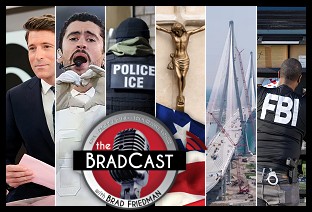 Trump's Presidency Now About Little More Than Racism, Corruption, Culture War Nonsense: 'BradCast' 2/10/26
Trump's Presidency Now About Little More Than Racism, Corruption, Culture War Nonsense: 'BradCast' 2/10/26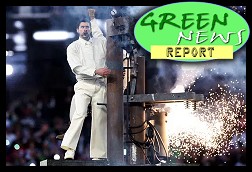 'Green News Report' 2/10/26
'Green News Report' 2/10/26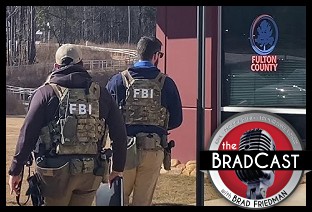 About Trump's FBI Raid of the Fulton County, GA Elections Warehouse: 'BradCast' 2/9/26
About Trump's FBI Raid of the Fulton County, GA Elections Warehouse: 'BradCast' 2/9/26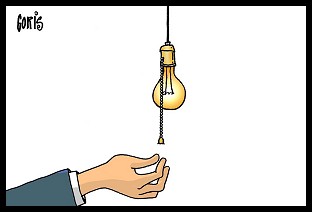 Sunday 'Dead in Darkness' Toons
Sunday 'Dead in Darkness' Toons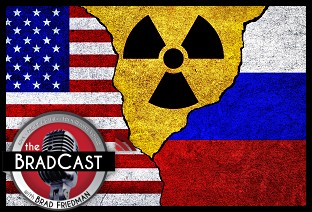 'New START' Treaty Allowed to End Amid New World Disorder: 'BradCast' 2/5/26
'New START' Treaty Allowed to End Amid New World Disorder: 'BradCast' 2/5/26 'Green News Report' 2/5/26
'Green News Report' 2/5/26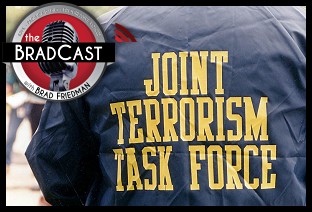 Trump Turns 'War on Terror' Tools Against Domestic Political Foes: 'BradCast' 2/4/26
Trump Turns 'War on Terror' Tools Against Domestic Political Foes: 'BradCast' 2/4/26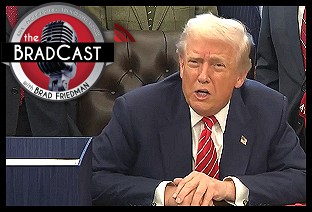 Losing Legally and Politically, Trump Threatens to 'Nationalize' Elections: 'BradCast' 2/3/26
Losing Legally and Politically, Trump Threatens to 'Nationalize' Elections: 'BradCast' 2/3/26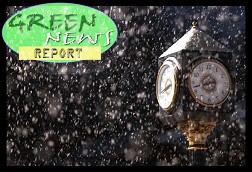 'Green News Report' 2/3/26
'Green News Report' 2/3/26 Bad and Good Bunnies, and an Electoral Shock in Deep 'Red' TX: 'BradCast' 2/2/26
Bad and Good Bunnies, and an Electoral Shock in Deep 'Red' TX: 'BradCast' 2/2/26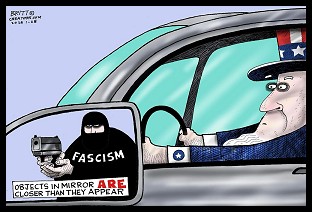 Sunday 'Mirror, Mirror' Toons
Sunday 'Mirror, Mirror' Toons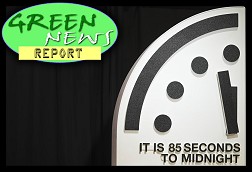 'Green News Report' 1/29/26
'Green News Report' 1/29/26 It's About Elections and the Windmills of His Mind: 'BradCast' 1/29/26
It's About Elections and the Windmills of His Mind: 'BradCast' 1/29/26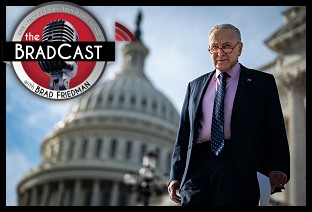 Govt Shutdown Over ICE Funding Near Certain This Weekend: 'BradCast' 1/28/26
Govt Shutdown Over ICE Funding Near Certain This Weekend: 'BradCast' 1/28/26 Trump Blinks, Bovino Out, MN Op Falters, Persists as Midterms Loom: 'BradCast' 1/27
Trump Blinks, Bovino Out, MN Op Falters, Persists as Midterms Loom: 'BradCast' 1/27 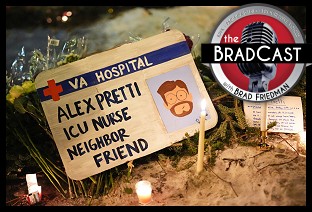 The ICE Murder of ICU Nurse Alex Pretti and the Heroes of Mpls: 'BradCast' 1/26/26
The ICE Murder of ICU Nurse Alex Pretti and the Heroes of Mpls: 'BradCast' 1/26/26 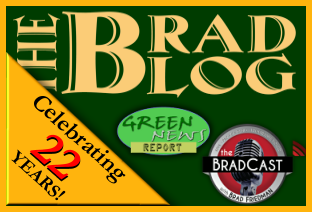 The BRAD BLOG: 22 Years and Still Counting
The BRAD BLOG: 22 Years and Still Counting Mr. Smith Testifies (Publicly) in Washington: 'BradCast' 1/22/26
Mr. Smith Testifies (Publicly) in Washington: 'BradCast' 1/22/26 World Turning Against Self-Destructing U.S. Under Trump: 'BradCast' 1/21/26
World Turning Against Self-Destructing U.S. Under Trump: 'BradCast' 1/21/26 Trump Waste, Fraud, Abuse on Voting, at DOJ, by DOGE: 'BradCast' 1/20/26
Trump Waste, Fraud, Abuse on Voting, at DOJ, by DOGE: 'BradCast' 1/20/26
 VA GOP VOTER REG FRAUDSTER OFF HOOK
VA GOP VOTER REG FRAUDSTER OFF HOOK Criminal GOP Voter Registration Fraud Probe Expanding in VA
Criminal GOP Voter Registration Fraud Probe Expanding in VA DOJ PROBE SOUGHT AFTER VA ARREST
DOJ PROBE SOUGHT AFTER VA ARREST Arrest in VA: GOP Voter Reg Scandal Widens
Arrest in VA: GOP Voter Reg Scandal Widens ALL TOGETHER: ROVE, SPROUL, KOCHS, RNC
ALL TOGETHER: ROVE, SPROUL, KOCHS, RNC LATimes: RNC's 'Fired' Sproul Working for Repubs in 'as Many as 30 States'
LATimes: RNC's 'Fired' Sproul Working for Repubs in 'as Many as 30 States' 'Fired' Sproul Group 'Cloned', Still Working for Republicans in At Least 10 States
'Fired' Sproul Group 'Cloned', Still Working for Republicans in At Least 10 States FINALLY: FOX ON GOP REG FRAUD SCANDAL
FINALLY: FOX ON GOP REG FRAUD SCANDAL COLORADO FOLLOWS FLORIDA WITH GOP CRIMINAL INVESTIGATION
COLORADO FOLLOWS FLORIDA WITH GOP CRIMINAL INVESTIGATION CRIMINAL PROBE LAUNCHED INTO GOP VOTER REGISTRATION FRAUD SCANDAL IN FL
CRIMINAL PROBE LAUNCHED INTO GOP VOTER REGISTRATION FRAUD SCANDAL IN FL Brad Breaks PA Photo ID & GOP Registration Fraud Scandal News on Hartmann TV
Brad Breaks PA Photo ID & GOP Registration Fraud Scandal News on Hartmann TV  CAUGHT ON TAPE: COORDINATED NATIONWIDE GOP VOTER REG SCAM
CAUGHT ON TAPE: COORDINATED NATIONWIDE GOP VOTER REG SCAM CRIMINAL ELECTION FRAUD COMPLAINT FILED AGAINST GOP 'FRAUD' FIRM
CRIMINAL ELECTION FRAUD COMPLAINT FILED AGAINST GOP 'FRAUD' FIRM RICK SCOTT GETS ROLLED IN GOP REGISTRATION FRAUD SCANDAL
RICK SCOTT GETS ROLLED IN GOP REGISTRATION FRAUD SCANDAL VIDEO: Brad Breaks GOP Reg Fraud Scandal on Hartmann TV
VIDEO: Brad Breaks GOP Reg Fraud Scandal on Hartmann TV RNC FIRES NATIONAL VOTER REGISTRATION FIRM FOR FRAUD
RNC FIRES NATIONAL VOTER REGISTRATION FIRM FOR FRAUD EXCLUSIVE: Intvw w/ FL Official Who First Discovered GOP Reg Fraud
EXCLUSIVE: Intvw w/ FL Official Who First Discovered GOP Reg Fraud GOP REGISTRATION FRAUD FOUND IN FL
GOP REGISTRATION FRAUD FOUND IN FL

































